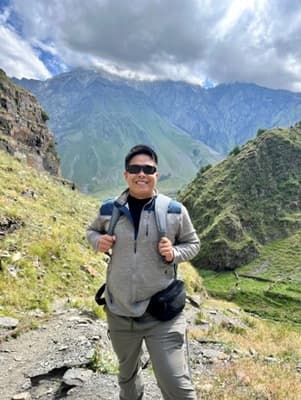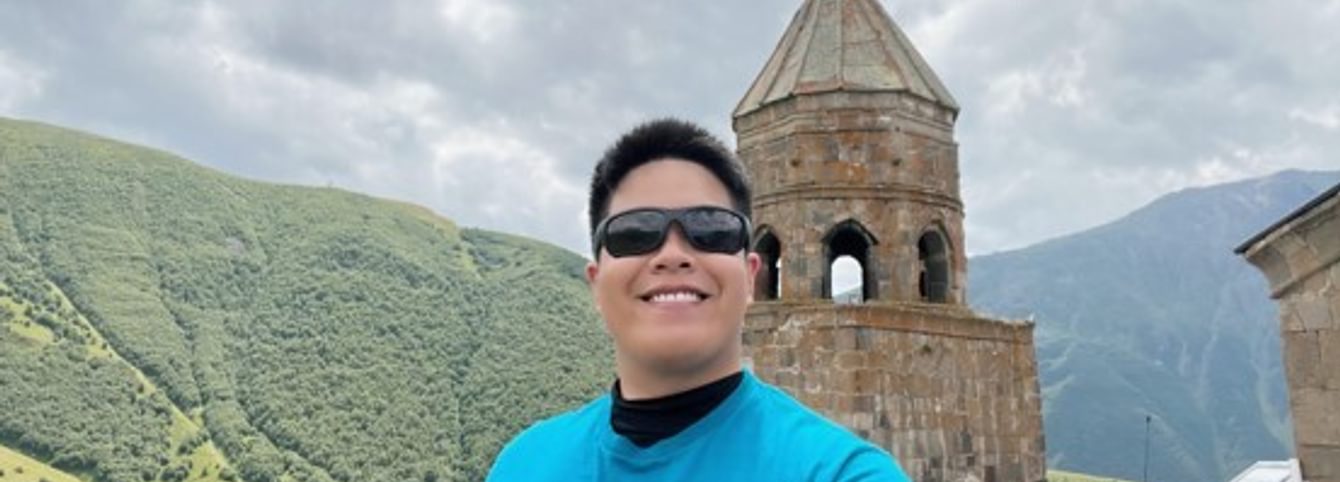Since middle school, Thai Nguyen has been captivated by Russian history. Ask the average person to name a significant moment in Russian history and you’ll likely be met with blank stares; Ask Thai and he’ll give you his top three. In order to take his Russian history knowledge to the next-level, Thai recognized that he needed to learn Russian. After teaching himself some basics during the pandemic, Thai applied and was accepted into CLS Spark hosted virtually by American Councils in Tbilisi, Georgia.

Through CLS Spark, Thai’s Russian language journey was sparked. He developed a foundation in the language, learned about Georgian culture and cuisine (more on that later), and built strong connections with his instructors and cohort mates. Now, Thai is kicking his Russian language study into high gear participating in the CLS Russian Program in Tbilisi, Georgia.
CLS Communications Officer Rori DiFiore had the opportunity to speak with Thai a week into his CLS Program on-site in Tbilisi. In this interview, Thai shares insights on Georgian hospitality culture, his experience meeting his instructors from CLS Spark for the first time in person, and getting to know his host mother and cohort mates in Tbilisi.
Thai is a Biochemistry and Molecular Biology major at the University of Houston. After he graduates, Thai plans to attend graduate school to study the intersection of International Relations and Human Health.
Rori DiFiore: Why were you motivated to study the Russian language?
Thai Nguyen: I've always been fascinated by Russian history, ever since we first learned about the Cold War in middle school. I delved deep on the topic and found periods of Russian history particularly interesting like the ruling period of Catherine the Great during the 18th century, at the renaissance of the Russian Empire. At that time, the empire was at its height in terms of cultural influence and geographic expansiveness. And then, of course, everyone knows about the Russian Revolution of the 20th century from 1918 through 1923 and the overthrow of the Romanovs, the last ruling family. And then the establishment of the Soviet government and the follow up USSR.
I mean, those three are my top favorite periods of Russian history to learn about. I've always wanted to be able to read the original Russian texts, but the opportunity just never came up in any of my academic classes, and then the financial situation, was never right for me to get private tutoring in Russian. So, in 2020, I started independently learning Russian language with all that free time that we had during the pandemic. After studying on my own, I found out about CLS Spark through my academic counselor at the University of Houston. I applied and then got accepted, and the rest is history.
RD: What has it been like returning to Tbilisi after participating in CLS Spark Russian hosted by American Councils in Tbilisi?
TN: I consider my situation to be very fortunate. I hate to be cliche about it, but I really think it was fate because I enjoyed my instructors during CLS Spark so much. I found them to be so knowledgeable, they're native speakers so they have a wealth of knowledge of the Russian language, but at the same time, they're incredibly patient. And I think that is even more important, their patience and their experience working with American students, many of whom are beginners. They were so receptive to me having no prior experience with the language, and at the same time so willing to help me learn, especially with a language where pronunciation is so important. They’ve also been receptive to answering questions and are generous with their time, even offering to spend extra time going over any issues that I might have.
RD: What was it like meeting your CLS Russian instructors in person for the first time?
Thai: My CLS Spark instructor Elmira was so surprised to see me here. We saw each other on our computer screens for two hours every week for six months. The first time we met in person—we just hugged and we were in disbelief, repeating “oh my goodness.” Nothing really beats face to face, right? She was really glad that I was here and that I was able to continue the program in Tbilisi. As part of CLS Spark, we were given cultural classes, so I already had some background on Tbilisi and Georgian culture from CLS Spark. Now to be able to experience it all in real life and live in this city, it’s amazing. I’m so fortunate that I had this opportunity to continue my CLS experience in Tbilisi.
RD: How have you found your CLS host family experience?
TN: My host mom has been great. I mean, going back to Georgina hospitality. I think she is like the perfect embodiment of that. She is so welcoming and curious. She is very eager to learn more about American culture. We have lovely conversations over dinner. She's a great cook. She’s very nurturing and loving.
RD: What has surprised you about your CLS experience so far?
TN: I’ve realized that hospitality is really at the core of Georgian society. When interacting with my host mom as an American, I have this urge to pitch in and help. You naturally want to pitch in when you're staying in someone else's house. However, she's not really into that concept. It's like, she's the host and you're the guest. You just sit at the table, she brings you the plates loaded with food, and once you're done, she handles the dirty plates and takes care of washing them herself. Initially, I had my doubts. I was like, "Really? Are you sure about this?" But she was like, "Absolutely, no doubt about it." So, I think challenging this would have been perceived as a direct offense to her sense of hospitality. It's not about being unappreciative or anything, it's simply respecting the cultural norms of your host country. If you were to push against this, it would strain the relationship. If there's anything you're uncertain about, you can always ask her directly. Like, "Should I take care of this?" If she says no, that's perfectly alright. It becomes a chance for you to learn. You get that "aha" moment where you're like, "Okay, this is how they demonstrate hospitality here." It's a window into the hospitality customs of Georgia.
RD: Do you have a favorite dish your host mom makes?
TN: Oh yes! So, she cooks traditional Russian meals, so of course, you have borsch, cabbage, and beets. She eats a very healthy diet, which I really appreciate, so there’s lots of vegetables at every meal. She also pickles her own tomatoes and cucumbers. She likes to tell me about the dishes, and the history behind it. It’s been a really good learning opportunity for me. My favorite thing she has made for me has been a traditional Russian soup with potatoes, chicken, and carrots. That’s been my favorite meal that she's cooked for me thus far. I told her if you cook this meal four times a week, I’d have no complaints.

RD: Are there ways you feel like CLS Spark has helped to prepare you for this experience?
TN: A lot of the thanks goes to my CLS Spark instructors. They have provided me with such a firm foundation for the Russian language. I also feel like they helped to prepare me for the cultural differences here. They even introduced me to some of the signature dishes here like Kinkali (a Georgian dumpling). We actually did a cooking class during CLS Spark where they showed us how to make Khachapuri (a traditional Georgian dish of bread filled with cheese shaped like a boat). Now I’m out here and I am trying it and eating it in-person!
RD: What has it been like getting to know your cohort mates so far?
TN: Two words come to mind—humbling and motivating. Humbling, because we all came here with different degrees of fluency with Russian, right? I have several friends here who are very advanced in their Russian fluency and that's been humbling. Because it's like, oh, my goodness, you are basically a native speaker. At the same time, it's a very supportive environment, because they're always willing to offer their help with homework or with questions that I have. It’s a very supportive group. And it's also very motivating to see where I could end up if I work hard enough.
RD: Why do you think others and in particular STEM majors (like yourself) should consider learning foreign languages?
TN: I come from a Vietnamese immigrant background. I could speak Vietnamese before I could speak English so to me, languages have always been so valuable, serving as an interpreter for my parents at a doctor's visit, for example. So, I've always seen the value of a language. As I’ve gotten older, that has become even more apparent to me. When I started my undergraduate career in STEM, I realized that learning a language, and going back and forth between languages, helps your brain to store more information. I can introduce myself in Vietnamese, English, Spanish and Russian now. Being able to do that increases your brain’s plasticity, that’s a neuroscience term, and increasing your plasticity helps you fight back diseases of aging like dementia.
As a biochemistry major, I took a neuroscience class which reinforced this all for me. A lot of STEM courses require memorizing and recalling lots of facts. So becoming comfortable storing different languages has also helped me to handle the demands of my STEM courses too. And then lastly, I’d say language is the key to unlocking any culture. Because you really get a feel for what a culture views as important through the language. For example, in Vietnamese language, we don’t really use articles. We stress more importance on the subject, the noun. That ties back to Vietnamese culture as well, where the emphasis is on viewing people as people first. There is so much that a language can show us about a culture.


